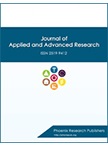Global impact and clinical management of severe respiratory syndrome coronovirus-2 (COVID-19)
DOI:
https://doi.org/10.21839/jaar.2020.v5.342Abstract
Coronaviruses are enveloped non-segmented positive-sense RNA viruses belonging to the family Coronaviridae and the order Nidovirales and broadly distributed in humans and other mammals. The recommendations for the management of COVID-19 are mentioned in a lot of Updated Literature such as in The "L. Spallanzani" National Institute for the Infectious Diseases. These recommendations are considered as expert's opinions, which may be modified according to newly produced literature data. In addition, Chloroquine and its derivative, hydroxychloroquine, have a long history as safe and inexpensive drugs for use in malaria-endemic regions and as daily treatments for autoimmune diseases, with the most common side effect being eye damage after long-term use (Kapoor and Kapoor 2020). Although previous studies have revealed that chloroquine has therapeutic activity against viruses, including human corona virus OC43 in animal models and SARS-CoV in cell culture studies. we proposed that from natural Medicine the polyphenol compounds in olive leaf extracts were responsible for the stimulation of probiotic Microbes growth and metabolism and that olive leaf extracts ingested in human diet might have the same effect on desirable components of the intestinal microflora, Herbal medicines, plant products, and phototherapeutic have been widely used all over the world since ancient times. Such as Orange, garlic, Bananas, and lemon have an effect on increasing the immune system. On the other hand; Gold nanoparticles (AuNPs) are a piece of evidence to treat the harmful responses arising from reactive oxygen species (ROS). Silver nanoparticles (AgNPs) are microbial agents which could be potentially used as an alternative to anti-viral to treat human infectious disease, especially influenza; there is a novel treatment by using magnetite nanoparticles as nanomedicine drug for Covid- 19.





 .
.